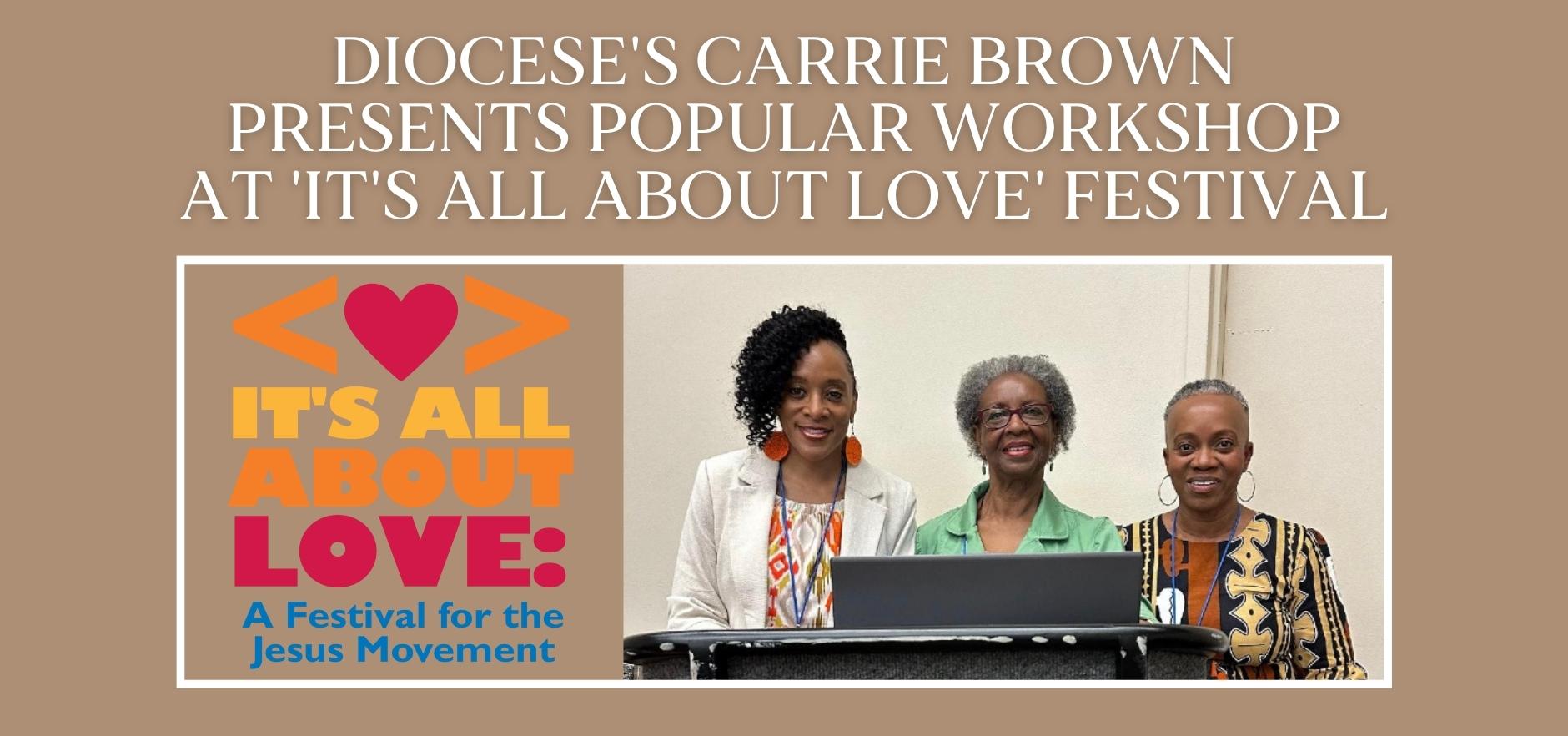
Workshop co-presenters, L-R: Donna K. Sweeting, M.A.; Mrs. Carrie Brown; the Rev. Dr. Rosemary Cook, LCSW-C | Photo courtesy Carrie Brown
Mrs. Carrie Brown, a parishioner at St. John the Baptist, Orlando, led a workshop at “It’s All About Love: A Festival for the Jesus Movement” held in Baltimore, Maryland, from July 9-12. The churchwide festival focused on worship, learning, community and action, organized around three topics: evangelism, racial reconciliation and creation care. Brown’s workshop was titled “It’s All About Love: Race, Mental Health, and Wholeness.”
Over 1,000 people from all nine provinces attended the festival. The Most Rev. Michael B. Curry, presiding bishop and primate of The Episcopal Church, delivered the opening sermon on July 9.
Brown is also president-elect of the Canon Nelson Pinder Union of Black Episcopalians Chapter of Central Florida, and a member of the National UBE Mental Health Task Force. She used her expertise to create a workshop centered on the critical theme of racial reconciliation.
“My vision was to explore the intersection between racism and mental health, a rarely addressed topic,” she said. “I believed it held immense transformative potential.”
Brown’s journey and call to work toward racial reconciliation began with her anti-racism and reparations involvement while living in Maryland. It continued through her instrumental role in extensive research conducted in the state of Maryland by the Diocese of Maryland’s Truth and Reconciliation Commission. This exploration eventually led to the creation of the “Trail of Souls: Journey Toward Truth and Reconciliation,” a documentary that debuted in 2022 at the 80th General Convention of The Episcopal Church.
Co-presenting with Brown were Donna K. Sweeting, M.A., project director of Faith-filled Families, a Lilly Endowment Initiative for Virginia Theological Seminary; and the Rev. Dr. Rosemary Cook, LCSW-C, president and CEO of Totally Whole Pastoral Counseling Services LLC. “I could not have done this without these women,” said Brown. “They made me look good!”
Fifty-eight people attended the 75-minute workshop, almost twice the maximum per the festival guidelines. “The turnout was wonderful, but there wasn’t as much time as I wanted to cover the topic fully,” Brown said.
While most attendees were clergy, medical professionals from Johns Hopkins and the University of Maryland Medical College also participated in the workshop.
“I was intimidated, leading a workshop on race and how it affects mental health, and seeing all of these mental health practitioners,” Brown explained. “Their feedback was very positive. A practitioner from Johns Hopkins commented that she had never dealt with integrated trauma produced by racism in whites. She liked how the workshop showed that racism is bad for mental health.”
A diverse group attended the workshop, she said. “Only eight people identified as ‘Black.’ The majority identified as ‘other’ or ‘white.'”
Brown used current events to illustrate bias. “There was an article about a Black man living in an apartment building who was always followed by a white woman who would question whether he was supposed to be there,” she said. “We talked about how the woman was affected by racism as well as the Black man.”
Because bias isn’t just based on race, the workshop covered gender and socioeconomic discrimination too. She explained, “To illustrate this, I pointed to a very broad-shouldered white man with a beard and said, ‘If you were the only person on the elevator when the doors opened at my floor, I wouldn’t get in by myself because you look intimidating. I, as a woman, would be afraid to be alone with you.'”
“We spent much time brainstorming to see how we might move forward,” Brown added. “One conclusion is that racism hurts everybody, and we must think about how it hurts us. Another idea is to be aware of preconceived notions, try to repair that thinking and be vocal in the public square.”
“We hope the workshop left an indelible mark on all who attended, equipping them with the tools and courage to continue the journey toward a more compassionate and inclusive world,” she said. “Racial reconciliation. It really is all about love.”
